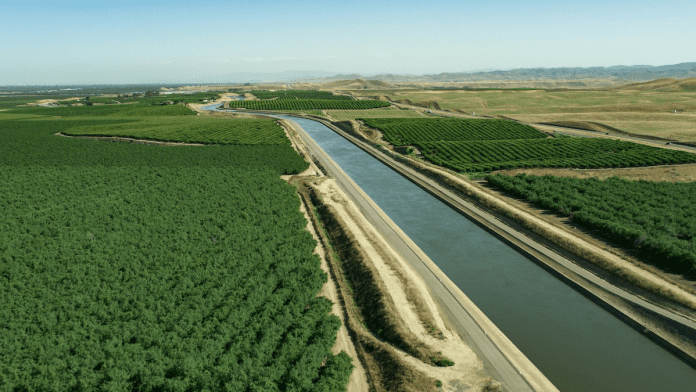🕒 Last updated on September 5, 2025
Nation’s largest irrigation district steps in with support
California’s long-debated Delta Conveyance Project received a strong boost this week. The largest irrigation system in the United States, the Imperial Irrigation District, openly declared its support. The district manages more than 3,000 miles of canals in Southern California and serves a massive amount of farmland.
The project, often called the “delta tunnel,” is designed to move water from the Sacramento-San Joaquin River Delta down to Southern California. It would use a giant underground tunnel system, buried 130 feet beneath the ground. Supporters say this project would deliver water in a safer way that could resist earthquakes and future disasters.
According to the California Department of Water Resources, the tunnel would supply clean and affordable water to 27 million people and about 750,000 acres of farmland. State officials believe it could protect water security during droughts and ensure water is not cut off if a big earthquake damages existing channels.
By giving its support, the irrigation district has taken a strong step in shaping the state’s water debate. The move also gives fresh energy to Governor Gavin Newsom’s efforts to speed up the project. He has pushed hard to cut through delays and move the project forward.
In a statement, Newsom said water systems are in urgent need of upgrades. He argued that too many attempts to modernize the state’s water supply have been stuck in endless red tape. He urged lawmakers to act quickly, calling the tunnel “vital infrastructure” for a hotter, drier future.
The project was deemed “essential” by the Imperial Irrigation District’s board of directors in a decision. Although the district doesn’t use water from the State Water Project, its officials stated that the tunnel is essential to repairing California’s deteriorating water infrastructure and solving the state’s water shortage issue.
Growing pushback and regional concerns
While the endorsement is a big win for the governor, opposition has been growing at the same time. Many lawmakers from the Delta region remain deeply concerned about the impacts of the project.
The impact on the Delta’s delicate environment is among the most frequent concerns. The Sacramento-San Joaquin Delta is home to rich wildlife, wetlands, and fish species. Environmental groups and local farmers fear that taking more water from the region will harm habitats and reduce the ability of farmers in the area to sustain their crops.
Texas Congressman Ronny Jackson challenges Gavin Newsom in federal court over redistricting battle
Some lawmakers say the plan conflicts with existing laws designed to protect the Delta. The Delta Reform Act, passed in 2009, set out rules to limit reliance on the Delta for exports of water. Critics argue that fast-tracking the tunnel would go against this promise and make the region more vulnerable.
In May, voices from the Delta region pointed out that their local agricultural economies could be hit hard if more water is diverted south. They said farmers already face water shortages, and the tunnel would only add to their struggles.
The growing opposition has created a divide within the governor’s own political party. Some Democratic representatives from the Delta have asked for more accountability. A request has been made for a full audit of the project so that lawmakers can review costs, legal issues, and possible harm to the environment before moving forward.
Financial commitments highlight stakes
The project has already begun to see large amounts of money committed to its development. In December 2024, the Metropolitan Water District of Southern California, which is the largest urban water supplier in the nation, approved more than $141 million for the tunnel. This funding is meant to keep the project’s planning and early work going.
That decision was another sign of how serious water agencies are about securing water supplies for the long term. For Southern California, where millions of residents rely on imported water, any disruption to the supply could have major consequences.
The Imperial Irrigation District’s latest resolution of support now adds another influential voice to the project. With both the state government and major water agencies aligning behind it, the Delta tunnel is moving closer to becoming a centerpiece of California’s water system.
Still, the tension remains between those who see it as necessary infrastructure and those who see it as a threat to the environment and local economies. The debate is far from quiet, but the latest endorsement has shown that momentum for the project is building, even as pushback continues across the Delta region.

